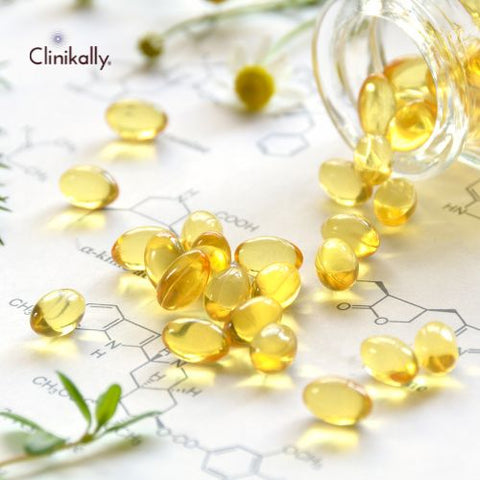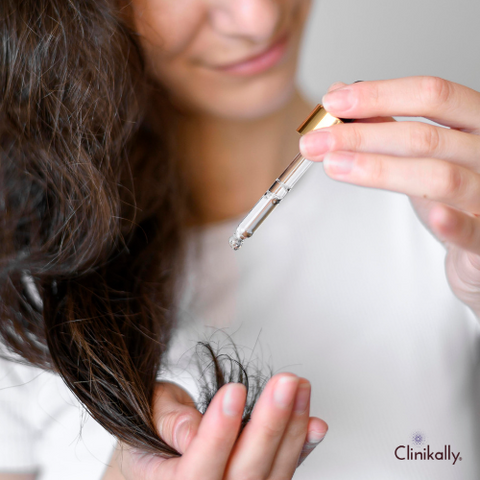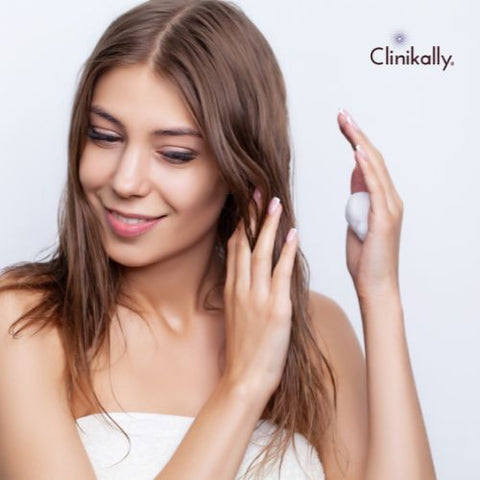If you've ever looked into hair loss medications, you've probably heard of finasteride and dutasteride. Dutasteride and finasteride are members of a class of drugs known as 5-alpha reductase inhibitors, or 5-ARIs. They work by preventing your body from converting testosterone into dihydrotestosterone, or DHT, a different type of androgen hormone.
Dutasteride is another medication that works in a similar way to Finasteride, but it blocks both type I and type II 5-alpha-reductase enzymes, which are responsible for the conversion of testosterone into DHT. This means that Dutasteride is potentially more effective than Finasteride, but it also has a higher risk of side effects. Dutasteride is usually prescribed as a 0.5mg oral capsule, taken once per day.
Finasteride is an FDA-approved medication that works by blocking the conversion of testosterone into dihydrotestosterone (DHT), which is a hormone that can contribute to hair loss. It is usually prescribed as a 1mg oral tablet, taken once per day.
So, which is better for hair loss? Both medications have been shown to be effective in clinical studies, so there is no clear answer to this question. Some doctors, however, may prefer Dutasteride for patients who have not responded well to Finasteride or who have severe hair loss. Finasteride, on the other hand, maybe a good choice for patients who are concerned about potential side effects because it has a lower risk of side effects than Dutasteride. The choice to use Dutasteride or Finasteride for hair loss should ultimately be made in consultation with a physician, who can assess the patient's particular circumstances and make a recommendation based on the patient's medical history, present medications, and other factors.
Understanding Dutasteride and Finasteride

Dutasteride and finasteride are both medications used to treat hair loss, particularly male pattern baldness. They work by inhibiting the conversion of testosterone into dihydrotestosterone (DHT), which is a hormone that can contribute to hair loss. DHT is known to shrink hair follicles, leading to thinner and weaker hair, and eventually causing the hair follicle to stop producing hair altogether.
Finasteride was originally approved for treating hair loss in 1997, while dutasteride was approved for treating enlarged prostates in 2001. However, both medications have been used off-label for treating hair loss, and both are considered effective in reducing hair loss and promoting hair growth.
Both dutasteride and finasteride are classified as 5-alpha-reductase inhibitors, which means they work by blocking the enzyme 5-alpha-reductase that converts testosterone into DHT. However, dutasteride inhibits both type I and type II 5-alpha-reductase, while finasteride only inhibits type II 5-alpha-reductase. This means that dutasteride is more effective at blocking DHT production than finasteride. Despite their similarities, there are some differences between dutasteride and finasteride that may influence a person's choice between the two.
What are Dutasteride and Finasteride?
Dutasteride and finasteride are medications that are used to treat male hair loss. Both drugs are 5-alpha-reductase inhibitors, which means they work by preventing testosterone from being converted into dihydrotestosterone (DHT). DHT is a hormone that causes hair follicles to contract, resulting in hair loss. Dutasteride and finasteride, by blocking DHT, can help prevent further hair loss and, in some cases, stimulate new hair growth. Both medications are taken orally and require a prescription from a healthcare provider.
Mechanism of Action
Dutasteride and finasteride are both 5-alpha-reductase inhibitors, which means they prevent the body from converting testosterone to dihydrotestosterone (DHT). DHT is a hormone that is responsible for the miniaturization of hair follicles in people who have androgenetic alopecia, also known as male pattern baldness. Both drugs can reduce the activity of the enzyme that causes hair loss by inhibiting the production of DHT. Dutasteride, on the other hand, inhibits both types of 5-alpha-reductase enzymes, whereas finasteride inhibits only one, which is why dutasteride is thought to be more potent than finasteride.
Side Effects and Effectiveness

Dutasteride and Finasteride both have potential side effects, but they are generally well tolerated. Reduced libido, erectile dysfunction, and decreased ejaculate volume are the most common side effects. Breast tenderness and enlargement, rash, and allergic reactions are less common side effects. Both drugs have been shown to be effective in the treatment of hair loss, though Dutasteride may be more effective than Finasteride. Dutasteride has been shown in studies to promote more hair growth and density than finasteride. However, Dutasteride carries a higher risk of side effects when compared to Finasteride. The decision between Dutasteride and Finasteride will ultimately depend on a person's unique circumstances, including the severity of their hair loss, their medical history, and their personal preferences. In order to choose the most effective course of action, it is essential to discuss these options with a licensed healthcare professional.
Comparison of Dutasteride and Finasteride
Dutasteride and finasteride are both 5-alpha-reductase inhibitors that are used to treat hair loss in men. They do, however, differ in a few ways:
-
Potency: Dutasteride inhibits both types of 5-alpha-reductase enzymes (Type 1 and Type 2) whereas finasteride only inhibits Type 2. This means that dutasteride is more potent than finasteride in blocking the conversion of testosterone to DHT.
-
Dosage: Dutasteride is typically prescribed at a dose of 0.5mg per day, whereas finasteride is prescribed at a dose of 1mg per day.
-
Effectiveness: Studies have shown that dutasteride is more effective than finasteride at preventing hair loss and promoting hair regrowth. However, this increased effectiveness comes with a higher risk of side effects.
-
Side effects: Both dutasteride and finasteride have similar side effects, including decreased libido, erectile dysfunction, and decreased ejaculate volume. However, the incidence of these side effects is higher with dutasteride than with finasteride.
Dutasteride has a higher risk of side effects than finasteride, despite being more powerful and effective. The patient's medical history, hair loss pattern, and personal preferences should all be taken into consideration when choosing between the two medications.
Factors to Consider when Choosing a Hair Loss Treatment
There are several factors to consider when selecting a hair loss treatment. Here are a few of the most important:
-
Type of hair loss: Different types of hair loss necessitate distinct treatments. Male pattern baldness, for example, typically responds well to medications such as finasteride and minoxidil, whereas alopecia areata may necessitate immunotherapy or steroid injections.
-
Severity of hair loss: The extent of hair loss can also influence the best treatment strategy. In some cases, a hair transplant may be the most effective solution, whereas topical treatments may suffice in others.
-
Potential side effects: All hair loss treatments have potential side effects, so it's important to weigh the risks and benefits before starting a treatment. Some people may be more willing to tolerate side effects than others.
-
Convenience: Some hair loss treatments must be used on a daily or frequent basis, while others may only be used once or twice a week. When selecting a treatment, keep your lifestyle and schedule in mind.
-
Cost: Hair loss treatments can be costly, especially in the long run. Consider the treatment's cost and whether it fits within your budget.
-
Personal preference: Some people prefer natural remedies or non-medication-based treatments, whereas others prefer pharmaceutical options.
It's crucial to consult a dermatologist or healthcare provider to find the best hair loss treatment for your unique requirements and circumstances.
Natural Hair Care Tips to Prevent Hair Loss

Sure, here are some natural hair care tips that may help prevent hair loss:
-
Eat a balanced diet: A diet that is rich in vitamins and minerals is essential for healthy hair growth. Include foods that are high in vitamins A, B, C, D, and E, as well as iron, zinc, and protein in your diet.
-
Massage your scalp: Massaging your scalp can stimulate blood flow to your hair follicles and encourage healthy hair growth. You can use essential oils such as rosemary or peppermint oil for added benefits.
-
Avoid harsh chemicals: Chemical treatments such as hair dyes, perms, and relaxers can damage your hair and lead to hair loss. Try to limit your use of these products and opt for natural hair care alternatives.
-
Protect your hair from the sun: Excessive sun exposure can damage your hair and scalp, leading to hair loss. Wear a hat or use a scarf to protect your hair when spending time in the sun.
-
Use gentle hair care products: Harsh shampoos and conditioners can strip your hair of its natural oils and cause damage. Look for gentle, natural hair care products that are free of sulfates and parabens.
-
Avoid tight hairstyles: Tight hairstyles such as braids, weaves, and ponytails can cause traction alopecia, a type of hair loss caused by pulling on the hair follicles. Opt for looser hairstyles that don't put as much strain on your hair.
-
Manage stress: Stress can lead to hair loss, so finding ways to manage stress can help prevent hair loss. Practice relaxation techniques such as meditation or yoga, or try taking a walk outside to clear your mind.
You should seek the advice of a healthcare professional if you are experiencing hair loss or other hair-related issues because these natural hair care tips may not work for everyone.
Tips for Healthy Hair and Natural Remedies
Here are some recommendations for natural remedies and hair care:
-
Maintain a nutritious diet: Eating a diet full of vitamins and minerals can help you maintain healthy hair. Nutrient-rich foods that can encourage hair growth include leafy green vegetables, eggs, avocados, nuts, and nuts.
-
Keep hydrated: Water is essential for keeping your body and hair hydrated and preventing breakage. Try to consume 8 to 10 glasses of water daily, at the very least.
-
Use gentle hair care products: Harsh shampoos and conditioners can strip your hair of its natural oils and cause damage. Look for gentle, natural hair care products that are free of harsh chemicals.
-
Avoid using heat styling tools: Using curling irons and straighteners can harm your hair. If you must use these tools, use them sparingly and always use a heat protectant spray.
-
Get regular trims: Regular trims can help prevent split ends and keep your hair healthy.
-
Use natural remedies: Natural remedies like coconut oil, aloe vera, and apple cider vinegar can all help promote healthy hair growth. You can apply coconut oil to your hair as a deep conditioning treatment, use aloe vera as a scalp treatment, or rinse your hair with apple cider vinegar to help restore its natural pH balance.
-
Reduce stress: Stress can cause hair loss, so it’s important to find ways to manage stress in your life. Try practicing yoga, meditation, or deep breathing exercises to help reduce stress and promote relaxation.








































